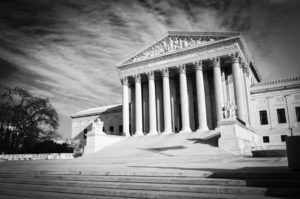Supreme Court Round-Up

Last Fall, the AHA signed on to three Supreme Court amicus briefs in cases that involve issues central to humanist values.
The first friend of the court brief was submitted in the reproductive rights case, Dobbs v. Jackson Women’s Health Organization, which challenges the constitutionality of a Mississippi law that bans abortions after the 15th week of pregnancy. The brief argues that the justices should affirm the Fifth Circuit’s ruling to protect abortion and reproductive rights for all.
“The separation of church and state forbids the government from imposing fundamentalist Christian doctrine on citizens,” noted AHA Legal Director and Senior Counsel Monica Miller.
Mississippi passed the legal restrictions at the heart of the Dobbs case in 2018. The law was challenged by Jackson Women’s Health Organization, the only licensed abortion provider in the state. This will be the first time, since the landmark abortion decision in Roe v. Wade, in which the Court will rule on the constitutionality of a pre-viability abortion ban.
The brief, authored by counsel for Americans United for Separation of Church and State and joined by the AHA, along with the Interfaith Alliance Foundation and Bend the Arc: A Jewish Partnership for Justice, argues that U.S. religious pluralism makes government involvement in questions of theology problematic.
A few days later, the AHA also signed on to an amicus brief in another Supreme Court case—this one about capital punishment—joining with other secular organizations to weigh in on Ramirez v. Collier. This case deals with the constitutionality of the death penalty and the religious free exercise rights of incarcerated persons.
“If the Supreme Court truly cares about religious freedom, it will end the anachronistic practice of capital punishment, which is sustained by fundamentalist Christian doctrine, as it is completely at odds with our country’s promise of civil liberty,” said Miller.
The brief argues that the Court should avoid the issue of whether Texas’s policy of disallowing spoken prayer and physical contact inside the execution chamber is permissible and rule that the death penalty is unconstitutional altogether.
Ramirez, convicted on murder charges in 2008, is currently serving a death sentence. He requested that his Baptist pastor be allowed to put his hands on Ramirez’s body and pray out loud while the lethal injection occurs. However, the state of Texas refused to grant his request. Presently, the law requires that a government entity demonstrate a compelling interest when burdening the right to freely exercise one’s religion, which Texas has not demonstrated. This case has broad implications for the Court’s treatment of the religious free exercise clause.
The Ramirez amicus brief, submitted by the Freedom From Religion Foundation and co-signed by the AHA and American Atheists, argues that the Court should hold that capital punishment, as a practice, is unconstitutional and Biblically-based. It also argues that state-sponsored executions violate one’s ability to freely exercise their religion and, if executions are allowed to take place, end-of-life accommodations must be made available to all.
“In the western world, the death penalty is a barbaric relic that often has been justified by religious scripture, and it has no place in modern society,” the brief states, continuing later, “While the root source of capital punishment may not be solely biblical, in the western world that has been the sourcebook for the death penalty.”
The AHA has long voiced its opposition to capital punishment, believing that the practice reflects a disregard for fundamental human rights, and strongly denounces it under all circumstances.
Lastly, the AHA joined a third amicus brief filed in the Supreme Court in the case Carson v. Makin, regarding whether Maine’s tuition-assistance program supported by public funds must support religious schools under the First Amendment.
This amicus brief was also authored by Americans United for Separation of Church and State and co-signed by the AHA and a number of other prominent religious and civil rights organizations.
The Carson v. Makin case was brought by two sets of parents who want to use public, state funding to send their children to private Christian schools. The friend-of-the-court brief asserts that Maine’s program differs from the program upheld last year in Espinoza v. Montana Department of Revenue, as Maine’s program characterizes schools based on the “religious use” of funds and whether a school promotes religion or teaches through a faith-based lens, rather than just the schools religious “status.”
The brief makes the argument that it is unconstitutional for public funds to support religious instruction. Since religious instruction in schools is a core means of supporting a ministry, states should not be required to fund religious instruction on an equal basis with nonreligious instruction, in accordance with the Free Exercise Clause of the First Amendment. The brief calls upon the Supreme Court to affirm the ruling by the First Circuit Court of Appeals.
The AHA is vehemently opposed to the use of taxpayer dollars to fund religious instruction, considering that it results in the unfair, forced participation of the nonreligious in supporting religious indoctrination.
Oral arguments in these cases were heard in late 2021. Decisions are expected later in 2022.
